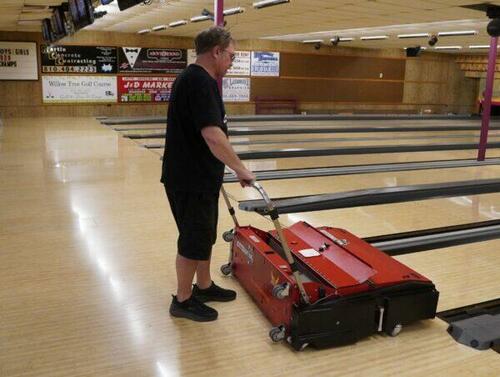
Authored by Steven Kovac via The Epoch Times (emphasis ours),
A coalition of five bowling alleys and family entertainment centers is suing Michigan’s Gov. Gretchen Whitmer, a Democrat, for losses incurred due to her mandatory COVID-19 shutdowns in 2020.

Michigan Dept. of Health and Human Services director Robert Gordon is also a defendant in the case.
The plaintiffs allege that the shutdowns imposed by Whitmer and Gordon were a “taking” of their businesses without just compensation in violation of both the state and the U.S. Constitution.
The case has been winding its way through the federal courts since January 2021.

The coalition lost the first round of the legal battle when the U.S. District Court for the Western District of Michigan ruled against it.
Oral arguments were recently held before a three-judge panel of the US Court of Appeals Sixth Circuit.
Plaintiff’s chief counsel David Kallman told The Epoch Times after the appeals court hearing, “The oral arguments from both sides were vigorous. The judges asked a lot of questions. It was the kind of proceeding that makes you proud to be a lawyer.
“Even the defense acknowledges that we are presenting ‘novel’ arguments.
“Michigan is the only state in the nation where a governor’s public health emergency powers were overturned as unconstitutional.
“If we lose in the court of appeals, we will take this case to the U.S. Supreme Court.”
Scott Bennett, executive director of the Independent Bowling and Entertainment Centers Association, told The Epoch Times,
“The governor’s actions were devastating to our industry.
“Things went from ‘two weeks to slow the spread’ to indefinite shutdowns.”
Bennett said that the forced closures were not based on solid scientific proof that bowling alleys and family entertainment centers would spread the virus any more than the Walmart stores or the GM plants that were allowed to remain open.
“They were allowed to operate with hundreds and even thousands of people in them but we had to shut down. We feel our industry was unfairly singled-out.
“We cannot stand for a repeat of such arbitrary treatment and don’t want the people of Michigan to forget what was done to them.”
With the recent uptick in COVID cases and the approaching mid-term elections, Bennett said his members that survived the 2020 shutdowns feel like it can happen all over again.
“It’s like operating day-to-day with a hammer held over your head. The uncertainty is altering business plans. The value of our businesses is dropping through the floor,” Bennett said.

Fred Kautz, the proprietor of Kautz’s Shore Lanes in Lexington, Michigan, started working in the family business when he was 13.
The business has 12 bowling lanes, a bar, an arcade, a restaurant, and living quarters upstairs.
“We’ve owned this place for 42 years. For me and my family, it’s more than a place to work. It’s a way of life. And it has become an institution in our community—a real gathering place,” said Kautz.
He said he is still smarting from what happened after Whitmer’s executive actions were ruled unconstitutional by the Michigan Supreme Court in the fall of 2020.
“We got a little reprieve. We thought we were in the clear until she came back with another round of forced closures, this time under the authority of the Michigan Department of Public Health.
“The first 30 days knocked us right on our butts. But we were willing to cooperate, to do our part. We were all scared and we did not want to see harm come to anybody.
“We lost a lot of money at the time. We are coming back slowly, but our overall revenue is still down 20 percent from pre-pandemic days. That’s hard to make up.
“In the spring of 2020, I tried to do what was recommended and go along. Never again!
“If my Dad was still alive, he’d have never closed at all,” said Kautz.
Brian and Mindy Hill, owners of I.C. Strikes, a 16-lane bowling alley, bar, and snack bar in Imlay City said their business was hit hard by the shutdowns.
Brian was the town barber for 25 years, before purchasing the bowling alley where he learned to bowl as a child.
“We took over in December 2018. We’d saved up money to buy this place and make some upgrades. When COVID hit, we were forced to close down. It took all the money we saved for improvements just to survive,” said Brian.
The Hills said they never thought they’d see the day when their own government could do something like that to them.

“They shut us down. They took away our livelihood with no end date in sight. Then they wanted to loan us money. Think about that. They first put us in a situation where we had zero income to pay our previous debt. And then they wanted to loan us more money.
“Lots of small business people lost their businesses but kept their debt. It ruined them,” said Brian.
The Hills did apply for and receive a Small Business Administration loan at 3.25 percent interest for 30 years, and they participated in the Paycheck Protection Program which helped their business survive.
Up the road from the Hill’s bowling alley is Jump City, a large indoor recreation center offering an array of bouncy houses and arcade games for children.
Assistant manager Mary Bacon told The Epoch Times, “We lost a lot of business. We were forced to close for 15 months and had to make our payments with no income.”
Bacon remembers the morning of March 16, 2020, when many area businesses were gearing up for big St. Patrick’s Day celebrations.
“By afternoon everybody had to close. All that food went to waste.
“The shutdown was supposed to be for a couple of weeks. Nobody foresaw it would drag on for a year and three months.
“Oh, they said we could open again, but they so severely restricted the number of customers that we lost all of our big birthday parties. With so few kids allowed in, we couldn’t operate. We were losing too much money.”
Bacon said people are coming back to the center but are still scared, even though the games and bouncy houses are continuously cleaned and sanitized.

Before the pandemic, Danny Brown owned a roller rink in Grand Blanc and Owasso, two south-central Michigan towns.
“The lockdowns forced us to sell the Owasso rink for less than half of what we paid for it. We will be trying to make up our loss for years to come.”
Brown, who is a plaintiff in the lawsuit, told The Epoch Times, “To keep going I had to decide to triple our debt. Since the shutdown, I am three-quarters of a million dollars deeper in debt.
“Small businesses put everything on the line. All of our personal and family money. I am personally responsible for our debt. If I die my children will have to pay it.”
Brown said Michigan’s government acted without a real understanding and regarded the state’s small businesses as “nonessential throwaways.”
“One of the reasons we filed suit is to push the government to think differently,” he said.
According to Brown, family entertainment centers like skating rinks, bowling alleys, arcades, pool halls, miniature golf, and go-cart tracks have been nearly wiped out.
“A few years ago, there were 3,500 roller skating rinks in the United States. Now there are 700. There were five rinks in Genesee County, now there are two.” he said.
Brown attributes the decrease to years of ongoing government mandates and interference that led up to the COVID-19 lockdowns.
“They took, they stole our businesses!” he said.
Donn Slimmen, another plaintiff in the case, owns Spartan West Bowling in the west Michigan resort town of Ludington.
“The lockdown just about killed us. It was 14 to 15 months of agony. Our bank payments and utility bills didn’t stop. We went from being two to three months behind to more months behind.
“We entered into survival mode. We ate a lot of pork and beans and hotdogs. We’re still trying to work ourselves out of the hole. By the end of this summer, we might be solvent again.
“We were lucky to survive. We are still hanging on by threads,” said Slimmen.
Along with 16 bowling lanes, Slimmen operates a full-service restaurant.
“It’s never come back. Pre-pandemic, we’d serve 200 customers at an ordinary Friday fish fry. Now our best night is 100.
“Our restaurant went from a thriving seated-guest business to a take-out operation grossing only two to three percent of the seated sales.
“We were spending $400 to take in proceeds of $100.
“The politicians and bureaucrats don’t understand. They never cleaned a toilet seat or climbed into a bowling machine to fix it,” said Slimmen.
Slimmen blames Gov.Gretchen Whitmer for the plight of his community and the state.
“You didn’t see Republican governors closing businesses. Their states did so much better.
“Drive through downtown Ludington or Muskegon and look at all the boarded-up storefronts. So many places are out of business. Michigan is in terrible shape,” Slimmen said.
The Tomassoni family has been in the bowling business for 84 years in the western Upper Peninsula town of Iron Mountain, Michigan.
“We had to close bowling and our banquet facility a total of 161 days in two different periods of time in 2020. After the second shutdown, we could operate at 25 percent occupancy and only during restricted hours. No wedding receptions, no special events. It was a disaster.
“It ripped my heart out. I am so bitter towards my government,” said owner Pete Tomassoni.
Tomassoni’s business suffered further because of its proximity to Wisconsin which is only minutes away.
“Wisconsin closed for just 30 days. For the most part, they were wide open. That really hurt us.
“Our governor was picking and choosing which of our state’s businesses could operate. To force a business to close with no notice and without proven science is straight out wrong.
“I think that she came down so hard on small business because we, by and large, lean to the right.
“The state dangled the threat of yanking business licenses to keep people in line.
“Some of our businesses tried to defy the state and stayed open
Authored by Steven Kovac via The Epoch Times (emphasis ours),
A coalition of five bowling alleys and family entertainment centers is suing Michigan’s Gov. Gretchen Whitmer, a Democrat, for losses incurred due to her mandatory COVID-19 shutdowns in 2020.

Michigan Dept. of Health and Human Services director Robert Gordon is also a defendant in the case.
The plaintiffs allege that the shutdowns imposed by Whitmer and Gordon were a “taking” of their businesses without just compensation in violation of both the state and the U.S. Constitution.
The case has been winding its way through the federal courts since January 2021.

The coalition lost the first round of the legal battle when the U.S. District Court for the Western District of Michigan ruled against it.
Oral arguments were recently held before a three-judge panel of the US Court of Appeals Sixth Circuit.
Plaintiff’s chief counsel David Kallman told The Epoch Times after the appeals court hearing, “The oral arguments from both sides were vigorous. The judges asked a lot of questions. It was the kind of proceeding that makes you proud to be a lawyer.
“Even the defense acknowledges that we are presenting ‘novel’ arguments.
“Michigan is the only state in the nation where a governor’s public health emergency powers were overturned as unconstitutional.
“If we lose in the court of appeals, we will take this case to the U.S. Supreme Court.”
Scott Bennett, executive director of the Independent Bowling and Entertainment Centers Association, told The Epoch Times,
“The governor’s actions were devastating to our industry.
“Things went from ‘two weeks to slow the spread’ to indefinite shutdowns.”
Bennett said that the forced closures were not based on solid scientific proof that bowling alleys and family entertainment centers would spread the virus any more than the Walmart stores or the GM plants that were allowed to remain open.
“They were allowed to operate with hundreds and even thousands of people in them but we had to shut down. We feel our industry was unfairly singled-out.
“We cannot stand for a repeat of such arbitrary treatment and don’t want the people of Michigan to forget what was done to them.”
With the recent uptick in COVID cases and the approaching mid-term elections, Bennett said his members that survived the 2020 shutdowns feel like it can happen all over again.
“It’s like operating day-to-day with a hammer held over your head. The uncertainty is altering business plans. The value of our businesses is dropping through the floor,” Bennett said.

Fred Kautz, the proprietor of Kautz’s Shore Lanes in Lexington, Michigan, started working in the family business when he was 13.
The business has 12 bowling lanes, a bar, an arcade, a restaurant, and living quarters upstairs.
“We’ve owned this place for 42 years. For me and my family, it’s more than a place to work. It’s a way of life. And it has become an institution in our community—a real gathering place,” said Kautz.
He said he is still smarting from what happened after Whitmer’s executive actions were ruled unconstitutional by the Michigan Supreme Court in the fall of 2020.
“We got a little reprieve. We thought we were in the clear until she came back with another round of forced closures, this time under the authority of the Michigan Department of Public Health.
“The first 30 days knocked us right on our butts. But we were willing to cooperate, to do our part. We were all scared and we did not want to see harm come to anybody.
“We lost a lot of money at the time. We are coming back slowly, but our overall revenue is still down 20 percent from pre-pandemic days. That’s hard to make up.
“In the spring of 2020, I tried to do what was recommended and go along. Never again!
“If my Dad was still alive, he’d have never closed at all,” said Kautz.
Brian and Mindy Hill, owners of I.C. Strikes, a 16-lane bowling alley, bar, and snack bar in Imlay City said their business was hit hard by the shutdowns.
Brian was the town barber for 25 years, before purchasing the bowling alley where he learned to bowl as a child.
“We took over in December 2018. We’d saved up money to buy this place and make some upgrades. When COVID hit, we were forced to close down. It took all the money we saved for improvements just to survive,” said Brian.
The Hills said they never thought they’d see the day when their own government could do something like that to them.

“They shut us down. They took away our livelihood with no end date in sight. Then they wanted to loan us money. Think about that. They first put us in a situation where we had zero income to pay our previous debt. And then they wanted to loan us more money.
“Lots of small business people lost their businesses but kept their debt. It ruined them,” said Brian.
The Hills did apply for and receive a Small Business Administration loan at 3.25 percent interest for 30 years, and they participated in the Paycheck Protection Program which helped their business survive.
Up the road from the Hill’s bowling alley is Jump City, a large indoor recreation center offering an array of bouncy houses and arcade games for children.
Assistant manager Mary Bacon told The Epoch Times, “We lost a lot of business. We were forced to close for 15 months and had to make our payments with no income.”
Bacon remembers the morning of March 16, 2020, when many area businesses were gearing up for big St. Patrick’s Day celebrations.
“By afternoon everybody had to close. All that food went to waste.
“The shutdown was supposed to be for a couple of weeks. Nobody foresaw it would drag on for a year and three months.
“Oh, they said we could open again, but they so severely restricted the number of customers that we lost all of our big birthday parties. With so few kids allowed in, we couldn’t operate. We were losing too much money.”
Bacon said people are coming back to the center but are still scared, even though the games and bouncy houses are continuously cleaned and sanitized.

Before the pandemic, Danny Brown owned a roller rink in Grand Blanc and Owasso, two south-central Michigan towns.
“The lockdowns forced us to sell the Owasso rink for less than half of what we paid for it. We will be trying to make up our loss for years to come.”
Brown, who is a plaintiff in the lawsuit, told The Epoch Times, “To keep going I had to decide to triple our debt. Since the shutdown, I am three-quarters of a million dollars deeper in debt.
“Small businesses put everything on the line. All of our personal and family money. I am personally responsible for our debt. If I die my children will have to pay it.”
Brown said Michigan’s government acted without a real understanding and regarded the state’s small businesses as “nonessential throwaways.”
“One of the reasons we filed suit is to push the government to think differently,” he said.
According to Brown, family entertainment centers like skating rinks, bowling alleys, arcades, pool halls, miniature golf, and go-cart tracks have been nearly wiped out.
“A few years ago, there were 3,500 roller skating rinks in the United States. Now there are 700. There were five rinks in Genesee County, now there are two.” he said.
Brown attributes the decrease to years of ongoing government mandates and interference that led up to the COVID-19 lockdowns.
“They took, they stole our businesses!” he said.
Donn Slimmen, another plaintiff in the case, owns Spartan West Bowling in the west Michigan resort town of Ludington.
“The lockdown just about killed us. It was 14 to 15 months of agony. Our bank payments and utility bills didn’t stop. We went from being two to three months behind to more months behind.
“We entered into survival mode. We ate a lot of pork and beans and hotdogs. We’re still trying to work ourselves out of the hole. By the end of this summer, we might be solvent again.
“We were lucky to survive. We are still hanging on by threads,” said Slimmen.
Along with 16 bowling lanes, Slimmen operates a full-service restaurant.
“It’s never come back. Pre-pandemic, we’d serve 200 customers at an ordinary Friday fish fry. Now our best night is 100.
“Our restaurant went from a thriving seated-guest business to a take-out operation grossing only two to three percent of the seated sales.
“We were spending $400 to take in proceeds of $100.
“The politicians and bureaucrats don’t understand. They never cleaned a toilet seat or climbed into a bowling machine to fix it,” said Slimmen.
Slimmen blames Gov.Gretchen Whitmer for the plight of his community and the state.
“You didn’t see Republican governors closing businesses. Their states did so much better.
“Drive through downtown Ludington or Muskegon and look at all the boarded-up storefronts. So many places are out of business. Michigan is in terrible shape,” Slimmen said.
The Tomassoni family has been in the bowling business for 84 years in the western Upper Peninsula town of Iron Mountain, Michigan.
“We had to close bowling and our banquet facility a total of 161 days in two different periods of time in 2020. After the second shutdown, we could operate at 25 percent occupancy and only during restricted hours. No wedding receptions, no special events. It was a disaster.
“It ripped my heart out. I am so bitter towards my government,” said owner Pete Tomassoni.
Tomassoni’s business suffered further because of its proximity to Wisconsin which is only minutes away.
“Wisconsin closed for just 30 days. For the most part, they were wide open. That really hurt us.
“Our governor was picking and choosing which of our state’s businesses could operate. To force a business to close with no notice and without proven science is straight out wrong.
“I think that she came down so hard on small business because we, by and large, lean to the right.
“The state dangled the threat of yanking business licenses to keep people in line.
“Some of our businesses tried to defy the state and stayed open





